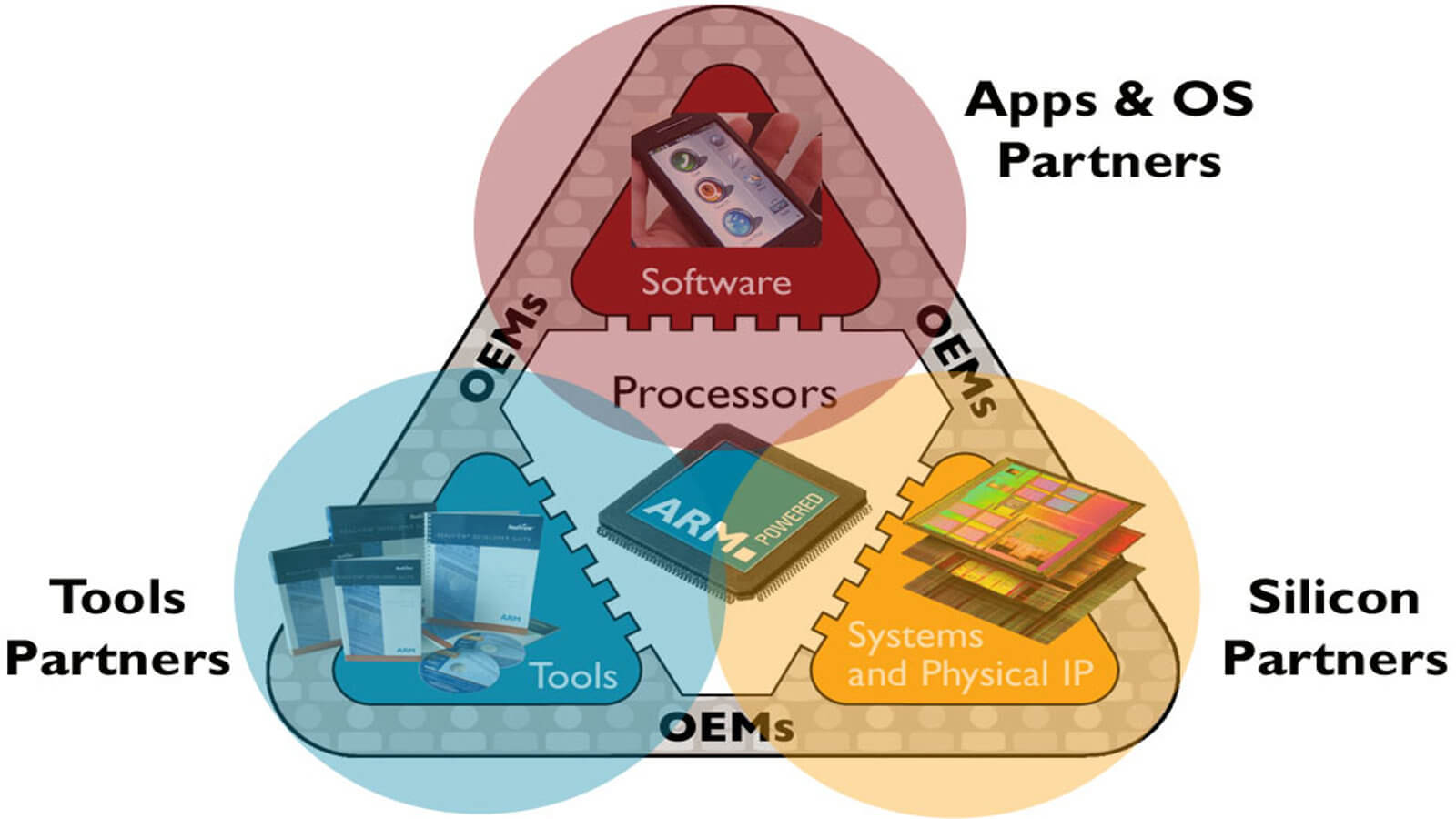Real-Time Operating Systems (RTOS)
ARM architecture is supported by all popular RTOS vendors in embedded. Here is a table showing the RTOS companies, their products, and an indication of which ARM processors they support.
By Alban Rampon

All major vendors of Real-Time Operating Systems (RTOS) support ARM architecture.
Many embedded systems require software to respond to inputs and events within a defined short period. Such systems can be categorized as hard real-time, where missing a response deadline is unacceptable (for example an anti-lock braking system), and soft real-time, where hitting a deadline is desirable but not critical. In both types of system, a degree of determinism is important.
RTOS is designed to control an embedded system and deliver the real-time responsiveness and determinism required by the controlled device. Applications run under the control of the RTOS, which schedules allocated CPU time.
In modern systems, a RTOS consists not only of a real-time kernel, but also higher-level functions such as device management (USB, UART, Ethernet, LCD, etc.), file systems, protocol stacks (CAN, TCP/IP, HTTP, etc.) and graphical user interfaces (GUI).
ARM Advantage
The ARM architecture is particularly well suited to the real-time and deterministic requirements of embedded systems, and the implementation of RTOS running on those systems:
- Small code footprint, allowing an RTOS to run from onboard memory
- Fast interrupt response to reduce context switching overhead
- Semaphore support via exclusive load-and-store instructions
- SVC instructions and exceptions to support privileged state operation for the RTOS kernel
- Separate stack pointers for each processor mode for easier memory management
- Sleep modes to minimize power consumption
Whatever your application, you are sure to find a comprehensive list of RTOS vendors who support the ARM architecture.
RTOS Vendors
The ARM architecture is supported by all popular RTOS vendors in the embedded market. Below is a table showing the RTOS companies, their products, and an indication of which ARM processor families they currently support:
| Company | RTOS | Cortex- | Classic | ||||
|---|---|---|---|---|---|---|---|
| A | R | M | ARM11 | ARM9 | ARM7 | ||
| Altreonic | OpenComRTOS | • | |||||
| American Megatrends | MegaRAC | • | |||||
| AVIX-RT | AVIX | • | |||||
| B Labs | Codezero Embedded Hypervisor | • | • | • | |||
| CMX Systems | CMX-RTX | • | • | • | • | • | • |
| Code Time Technologies | Code Time RTOS | • | |||||
| CooCox | CooCox CoOS | • | |||||
| Dalian uLoong | μTenux Open Source Embedded OS | • | • | • | |||
| DDC-I Inc | HeartOS | • | • | ||||
| eCosCentric | eCos | • | • | • | • | • | • |
| eForce | µC3 | • | • | ||||
| Enea Software AB | OSE | • | • | • | • | ||
| eSOL | eT-kernel, PrKERNEL | • | • | • | • | ||
| Evidence SRL | ERIKA Enterprise (OSEK) | • | • | ||||
| Express Logic | ThreadX | • | • | • | • | • | • |
| FreeRTOS.org | FreeRTOS | • | • | • | |||
| Green Hills Software | INTEGRITY, VelOSity | • | • | • | • | • | • |
| Hopen Software Eng Co Ltd | Hopen RTOS | • | • | • | • | ||
| HYCTRON Electronic Ltd | Embedded OS | • | • | ||||
| KADAK | AMX RTOS | • | • | • | |||
| Keil | Keil RTX | • | • | • | |||
| LynuxWorks | LynxOS, Blue Cat | • | • | • | |||
| Mentor Graphics | Nucleus ReadyStart | • | • | • | • | • | • |
| Micrium | µC/OS-III | • | • | • | • | ||
| Micro Digital Inc | SMX RTOS | • | • | • | • | ||
| OBP Research | ReaGOS | • | • | • | |||
| OpenSynergy GmbH | COQOS | • | • | ||||
| Pengutronix | OSELAS | • | • | • | • | • | |
| Phoenix Technologies | HyperSpace | • | • | ||||
| QNX Software Systems | Neutrino | • | • | • | |||
| Quadros Systems | RTXC Quadros | • | • | • | • | • | |
| Quantum Leaps | QP-nano | • | • | • | |||
| Radisys | Microware OS-9 | • | • | ||||
| RISC OS Ltd | RISC OS | • | • | ||||
| Rowebots Research | Unison v4 | • | |||||
| rt-labs AB | rt-kernel | • | • | • | |||
| RT-Thread.org | RT-Thread RTOS | • | • | • | |||
| SCIOPTA | SCIOPTA | • | • | • | • | • | • |
| Segger | EmbOS | • | • | • | • | • | |
| Sierraware | SierraOS | • | • | ||||
| Semihalf | FreeBSD | • | • | ||||
| SYSGO | PikeOS | • | • | ||||
| Umicos | Catapult RTOS | • | • | ||||
| Unicoi Systems | Fusion RTOS | • | |||||
| Wind River | VxWorks | • | • | • | • | ||
| Wittenstein | OpenRTOS, SafeRTOS | • | • | • | |||
By Alban Rampon
Re-use is only permitted for informational and non-commercial or personal use only.
